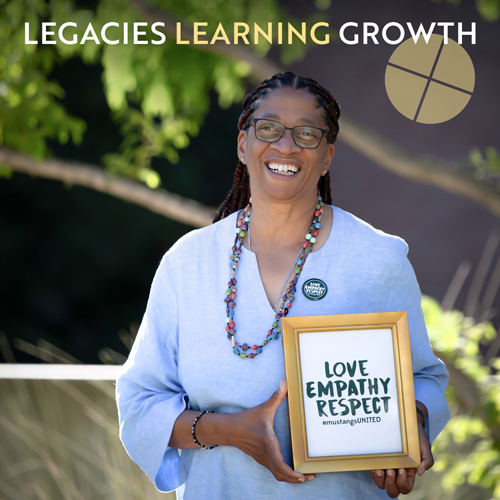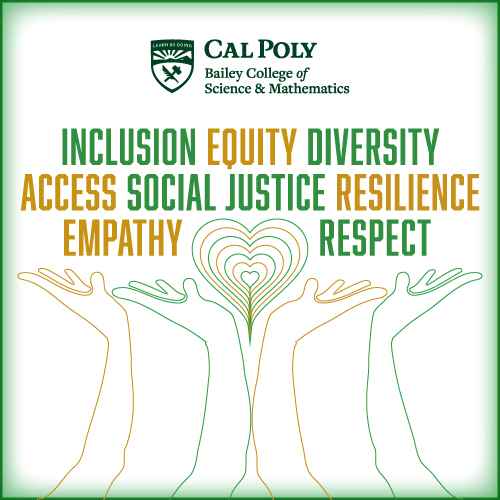Supporting Students Parenting Children
 Ashlee Hernandez, shown here at Cal Poly Commencement with her son, Noah. Hernandez graduated with a master’s degree in Higher Education Counseling and Student Affairs (HECSA). Photo Chris Leschinsky
Ashlee Hernandez, shown here at Cal Poly Commencement with her son, Noah. Hernandez graduated with a master’s degree in Higher Education Counseling and Student Affairs (HECSA). Photo Chris Leschinsky
RECENT INITIATIVES CREATE MULTIGENERATIONAL IMPACT AND ADD DIVERSITY, EQUITY AND INCLUSION TO THE CAL POLY COMMUNITY
OCTOBER 2024
 First-person report by Tina Cheuk, Cal Poly education professor
First-person report by Tina Cheuk, Cal Poly education professor
I vividly recall what it was like to be a student while caring for an infant. I gave birth to my first child eight months before starting a doctoral program at Stanford University in 2014.
I soon realized the nearest campus lactation space was 15 minutes away from my study and work area. Pumping breast milk in an open cubicle or the nearest restroom wasn’t ideal. This along with limited and high-cost childcare and the dearth of family housing were just a few of the challenges that I faced.
Experiencing firsthand the challenges of managing parenthood and schooling motivates me to advocate for students with children. I encourage others to join in this effort.
Our diverse student body at Cal Poly includes student parents, whose experiences enrich the resilience of our academic community and create lasting multigenerational impacts. Our commitment to fostering an inclusive and equitable campus celebrates all students, including those who bring unique strengths to their educational journey. This past June, 28 Cal Poly students with dependents celebrated graduation, offering workforce opportunities that were previously limited.
As a longtime education policy researcher and advocate for gender and racial equity in higher education, I’ve dedicated much of my career to understanding and addressing barriers that student parents encounter. Over 4.3 million undergraduate students in the U.S. are parents, representing one in five overall.
My work examines systems that help student parents thrive in learning spaces, ultimately benefiting families and communities. An urgent need exists for systemic changes to support this group, whose success can lead to positive outcomes for future generations.
The Impact of COVID-19 on Student Parents
An article that I published recently with the Southwestern Law Review highlighted the impact of the COVID-19 care crisis on student parents. The COVID-19 pandemic exacerbated existing inequalities, disproportionately affecting student parents who juggled academic responsibilities with increased caregiving duties. My research revealed that the pandemic not only intensified their challenges but also spotlighted the critical role of higher education institutions in providing support.
Support systems are crucial for providing equitable educational opportunities and economic security for student parents.
Inclusive policies include priority registration, affordable on-campus childcare and family housing options. Academic structures can involve hybrid and online courses, flexible attendance policies and class schedules that meet the needs of student parents. Essential support services encompass mental health resources, financial aid that addresses caregiving costs, and dedicated student parent resource centers offering tailored advising, peer support and family-friendly events.
By implementing these strategies, colleges and universities can better support student parents, creating environments that recognize their unique challenges and promote their success.
Community of Practice with the Urban Institute
In 2023, the Urban Institute selected Cal Poly as one of nine grantees in the Data-to-Action Campaign for Parenting Students. This initiative focuses on improving data collection on student parents, enabling us to better support their educational goals and ensure that their achievements benefit their families and communities. Our team collaborates closely with offices across campus to integrate this data into universitywide systems. At both state and national levels, we aim to share best practices around data collection, data visualization and evidence-based practices.
 ABOVE LEFT: Liberal studies student April Valdez-Garcia (left) watches her daughter Alaiya use a microscope in a Frost Center lab. Also seen are biological sciences Professor Alejandra Yep and liberal studies student Xavier Aguilar. Valdez-Garcia, Yep and Aguilar are members of the Nuestra Ciencia research team that addresses misconceptions in microbiology and advocates STEM to young Latinx students. ABOVE RIGHT: Valdez-Garcia and daughter Alaiya. Photos by Sarah Davenport
ABOVE LEFT: Liberal studies student April Valdez-Garcia (left) watches her daughter Alaiya use a microscope in a Frost Center lab. Also seen are biological sciences Professor Alejandra Yep and liberal studies student Xavier Aguilar. Valdez-Garcia, Yep and Aguilar are members of the Nuestra Ciencia research team that addresses misconceptions in microbiology and advocates STEM to young Latinx students. ABOVE RIGHT: Valdez-Garcia and daughter Alaiya. Photos by Sarah Davenport
Raising Up: Highlighting Barriers and Solutions
Through my involvement in the docu-series “Raising Up,” I’ve had the privilege of shedding light on the stories of student parents and innovative leaders. This project underscores the resilience of student parents and the need for targeted interventions.
The docu-series has been a powerful platform to amplify often unheard voices, showcasing the real-life experiences, strength and determination of student parents. Additionally, it has provided a forum to discuss how to make a tangible difference, such as childcare, affordable housing and workforce pathways tailored to the needs of student parents.
Innovative Initiatives at Cal Poly
In fall 2023, Cal Poly took a significant step by hiring a student services coordinator dedicated to supporting students with dependents. This pivotal role, housed in the Office of the Dean of Students and currently filled by Courtney Moore, has led to several initiatives that foster a supportive environment for student parents.
The program coordinator established a Student Parent Advisory Board, providing a platform for student parents, staff and faculty to influence campus policies. A monthly community newsletter was also launched to inform student parents about resources and programming that benefit them and their families.
Other measures include online training programs for staff and faculty regarding student parents, professional development funds to help student parents advance career goals and priority registration.
The Path Forward
Our work is far from complete. The journey toward equity and inclusion for student parents requires ongoing advocacy and research as well as commitment to implementing evidence-based solutions. Raising awareness and pushing for policies that support student parent success is crucial.
This success has a ripple effect that benefits families, communities and future generations. As we look forward, I hope our collective efforts will create a more inclusive and supportive environment for all students. Together, we can build a campus community where every student can thrive, regardless of their caregiving responsibilities.
To learn more, visit: studentparentjoy.org.
See more on April Valdez-Garcia in the Micro and Macro section.
Impactful Funding: Cal Poly has received a total of $135,000 of grant funding to advance the learning and well-being of student parents. Moreover, the university will receive $60,000 over two years (2023-25) from the Urban Institute’s Data-to-Action Campaign for Parenting Students to support initiatives to assist parenting students at Cal Poly. A $55,000 gift, administered by Professor Tina Cheuk through Bailey College, was granted in 2023 by Imaginable Futures, a global philanthropic investment firm, to support Student Parent Joy, a media and policy research initiative that she founded. A $20,000 grant in 2022 from the Center for California Studies at California State University Sacramento supports research led by Cheuk on student parents throughout California.
About the Author: Dr. Tina Cheuk is a Cal Poly education professor, an advisory board member for the California Alliance for Student Parent Success and the California State University Student Parent Network hosted by Michelson 20MM Foundation, and a steering committee member for the Student Parents Innovation Lab at the American Council on Education.





